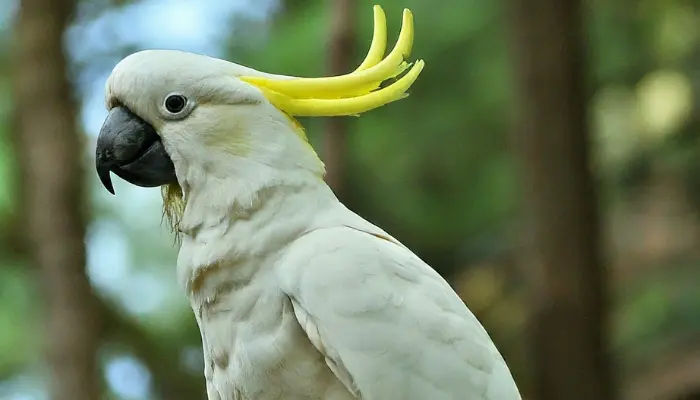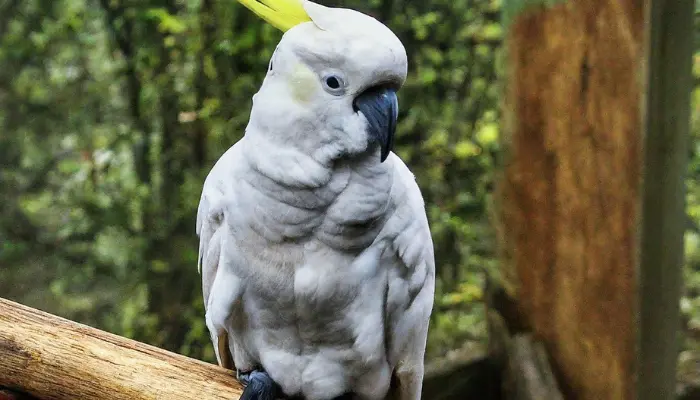Yes, cockatoos are often known for their affectionate nature. They can form strong bonds with their human caregivers and enjoy spending time interacting with them. Cockatoos are known to crave attention and can be quite social and seeking out physical contact such as cuddling and head scratches.
However, like any pet individual personalities can vary and some cockatoos may be more reserved or cautious than others. Proper care, attention, and socialization are essential for fostering a strong bond and ensuring a happy, affectionate relationship with a cockatoo.
Affectionate Behavior in Cockatoos
Cockatoos are known for their affectionate behavior which often endears them to their human companions. Here are some common displays of affection you might observe in cockatoos.
- Head Bobbing: Cockatoos often bob their heads as a sign of excitement or affection, especially when they see someone they like.
- Cuddling: Cockatoos enjoy physical contact and will often cuddle up to their favorite humans or even other birds.
- Nuzzling: Cockatoos may nuzzle their beaks against their human’s face or hand as a sign of affection.
- Feather Preening: Mutual preening is a common behavior among bonded cockatoos and their human companions. This involves gently grooming each other’s feathers, which helps strengthen their bond.
- Vocalization: Cockatoos are vocal birds and may express their affection through various vocalizations, such as chirps, whistles, or even mimicry of human speech.
- Playfulness: Cockatoos love to play, and engaging in interactive play sessions with their human can be a way for them to bond and show affection.
- Following: Cockatoos may follow their favorite humans around the house, wanting to be near them and participate in their activities.
- Regurgitation: In some cases, cockatoos may regurgitate food as a sign of affection, similar to how they would feed a mate or chick in the wild. This behavior is more commonly observed in bonded pairs but can also occur between a cockatoo and its human caregiver.
It is important to note that while these behaviors are generally indicative of affection because every cockatoo is unique and individual birds may express their feelings in different ways. Additionally, it is essential to understand and respect a cockatoo’s boundaries and preferences to build a healthy and trusting relationship with them.
Factors Influencing Affectionate Behavior
Several factors influence a cockatoo’s affectionate behavior towards humans or other birds.
- Socialization: Cockatoos that have been properly socialized from a young age tend to be more comfortable around humans and may show more affectionate behavior.
- Individual Personality: Just like humans, cockatoos have individual personalities. Some may naturally be more affectionate and outgoing, while others may be more reserved.
- Past Experiences: Cockatoos may exhibit affectionate behavior based on their past experiences with humans or other birds. Positive interactions can reinforce affectionate behavior, while negative experiences may lead to fear or avoidance.
- Species and Breed: Different species and breeds of cockatoos may have varying predispositions towards affectionate behavior. For example, some species, like the Umbrella Cockatoo, are known for their affectionate nature, while others may be more independent.
- Environment and Care: The environment in which a cockatoo lives and the quality of care it receives can significantly impact its behavior. Cockatoos that receive proper nutrition, mental stimulation, and social interaction are more likely to exhibit affectionate behavior.
- Health and Well-being: Cockatoos that are healthy and free from physical discomfort are more likely to engage in affectionate behavior. Conversely, birds that are unwell or in pain may withdraw or display aggressive behavior instead.
- Bonding: The strength of the bond between a cockatoo and its human or avian companions also influences affectionate behavior. Spending quality time together, engaging in positive interactions, and building trust can strengthen the bond and encourage affectionate displays.
Understanding these factors can help bird owners create a supportive environment that promotes positive interactions and affectionate behavior in their cockatoos. Additionally, being patient, observant, and responsive to the bird’s needs can foster a deeper connection and mutual affection between the bird and its human companions.

Tips for Fostering Affection in Cockatoos
Fostering affection in cockatoos requires patience, understanding, and a deep commitment to their well-being. Here are some tips.
- Respect their individuality: Each cockatoo has its own personality. Respect their preferences, likes, and dislikes. Pay attention to their body language to understand their mood and preferences.
- Social interaction: Cockatoos are social birds and thrive on interaction. Spend quality time with your cockatoo daily, talking to them, playing games, and providing opportunities for bonding.
- Positive reinforcement: Use positive reinforcement techniques such as praise, treats, and favorite toys to encourage good behavior. Reward them when they display affectionate behavior towards you.
- Gentle handling: Handle your cockatoo gently and with care. Avoid sudden movements or actions that may startle or frighten them. Build trust gradually through gentle interactions.
- Provide enrichment: Cockatoos are intelligent birds that need mental stimulation. Provide a variety of toys, puzzles, and activities to keep them engaged and entertained.
- Physical contact: Some cockatoos enjoy physical contact, such as head scratches or cuddling. Respect their boundaries and let them initiate contact if they are comfortable with it.
- Routine and consistency: Cockatoos thrive on routine and consistency. Establish a daily routine for feeding, playtime, and interaction to provide a sense of security and stability.
- Create a safe environment: Ensure that the environment is safe and secure for your cockatoo. Remove any hazards or toxic substances, and provide plenty of opportunities for exercise and exploration.
- Be patient: Building a strong bond with your cockatoo takes time and patience. Be patient and understanding, and allow your cockatoo to adjust to you and their new environment at their own pace.
- Consult with experts: If you are having difficulties fostering affection or understanding your cockatoo’s behavior, consider consulting with avian behaviorists or experienced bird owners for guidance and support.
By implementing these tips and being attentive to your cockatoo’s needs. Tou can foster a strong and affectionate bond with your feathered friend.
Conclusion
the affectionate nature of cockatoos makes them beloved companions for many bird enthusiasts. Their propensity for bonding with humans is evident through various behaviors such as cuddling, vocalizations, and playful interactions. However, it’s crucial to acknowledge the individuality of each cockatoo and respect their boundaries and preferences.
Factors like socialization, past experiences, and overall care significantly influence their affectionate behavior. By understanding these factors and following tips for fostering affection, bird owners can cultivate a deep and mutually rewarding relationship with their cockatoos. Patience, understanding, and a commitment to providing a nurturing environment are key to nurturing a strong and affectionate bond with these intelligent and charismatic birds.
